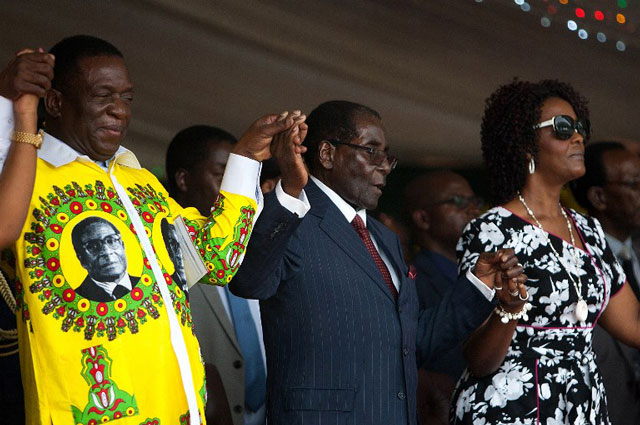
– ‘A turning point’ –
“(Mugabe) has previously warned the military to stay away from ZANU-PF’s succession race.
“His authority over the military has never been tested in this way. If he does nothing, it might be regarded as a sign of weakness. If he puts his foot down, it could result in open confrontation.”
Chiwenga, 61, was on official business in China when Mnangagwa was removed. They were both prominent figures in the struggle for independence from Britain, along with Mugabe.
Mnangagwa was widely seen as Mugabe’s most loyal lieutenant having worked alongside him for more than 40 years and his ouster sent shockwaves through the region.
He fled the country and is thought to be in South Africa but has yet to make a public appearance following his searing five-page condemnation of Grace’s ambition and Mugabe’s leadership style.
Shadrack Gutto, the director of the Centre for African Renaissance Studies at the University of South Africa, told AFP that if Grace attempted to take control, the army “will throw her out and she can go into exile or die”.
“They will not accept Grace Mugabe as president of Zimbabwe… (This) is a turning point in Zimbabwe because Robert Mugabe is semi-senile.”
Wright Chirombe, a 36-year-old barber in Harare, welcomed the army’s pledge to intervene.
“We have a ruling party that has been hijacked by individuals who want to create a dynasty. All these people want is their own gains and to protect those gains. No one cares about the ordinary people’s suffering,” he said.
But Zimbabwe’s business community, which is already contending with shortages of foreign currency and essential supplies caused by economic uncertainty, was more cautious about Chiwenga’s intervention.
“The general can talk about the revolution but it does not help the ordinary people. The people just want bread and butter,” said 37-year-old Oscar Muponda who runs a technology retailer in the capital.
TEXT – FULL STATEMENT AS READ
Military Statement by Zimbabwe Army Chief November 2017 by The Independent Magazine on Scribd
 The Independent Uganda: You get the Truth we Pay the Price
The Independent Uganda: You get the Truth we Pay the Price





